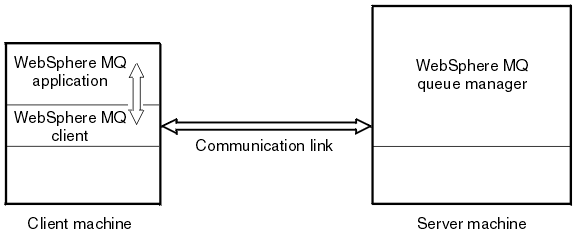What is a WebSphere MQ client?
A WebSphere MQ client is a component of the WebSphere MQ product that can be installed on a system on which no queue manager runs. It enables an application, running on the same system as the WebSphere MQ client, to connect to a queue manager that is running on another system and issue MQI calls to that queue manager. Such an application is called a WebSphere MQ client application and the queue manager is referred to as a server queue manager.
A WebSphere MQ client application and a server queue manager communicate with each other by using an MQI channel. An MQI channel starts when the client application issues an MQCONN or MQCONNX call to connect to the queue manager and ends when the client application issues an MQDISC call to disconnect from the queue manager. The input parameters of an MQI call flow in one direction on an MQI channel and the output parameters flow in the opposite direction.
Figure 1. Link between a client and server
The following platforms can be used. The combinations depend on which WebSphere MQ product you are using and are described in Platform support for WebSphere MQ clients.
Windows
UNIX systems
Windows
z/OS
The MQI is available to applications running on the client platform; the queues and other WebSphere MQ objects are held on a queue manager that you have installed on a server machine.
An application that you want to run in the WebSphere MQ client environment must first be linked with the relevant client library. When the application issues an MQI call, the WebSphere MQ client directs the request to a queue manager, where it is processed and from where a reply is sent back to the WebSphere MQ client.
The link between the application and the WebSphere MQ client is established dynamically at runtime.
We can also develop client applications using the WebSphere MQ classes for Java or WebSphere MQ classes for Java Message Service (JMS). We can use Java and JMS clients on the i5/OS and z/OS platforms as well as on UNIX and Windows. The use of Java and JMS is not described in this book. For full details on how to install, configure, and use WebSphere MQ classes for Java and WebSphere MQ classes for JMS see WebSphere MQ Using Java.
Home
